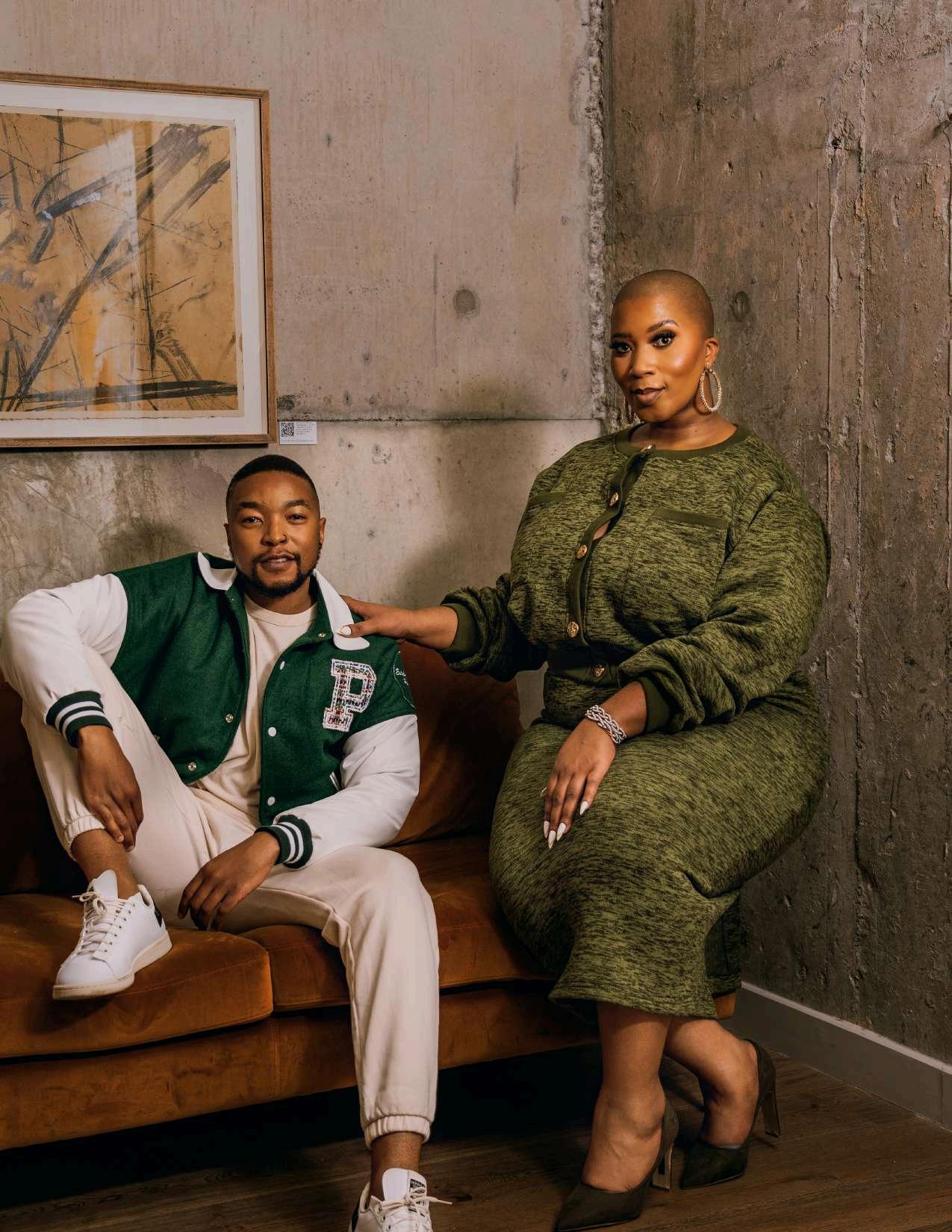
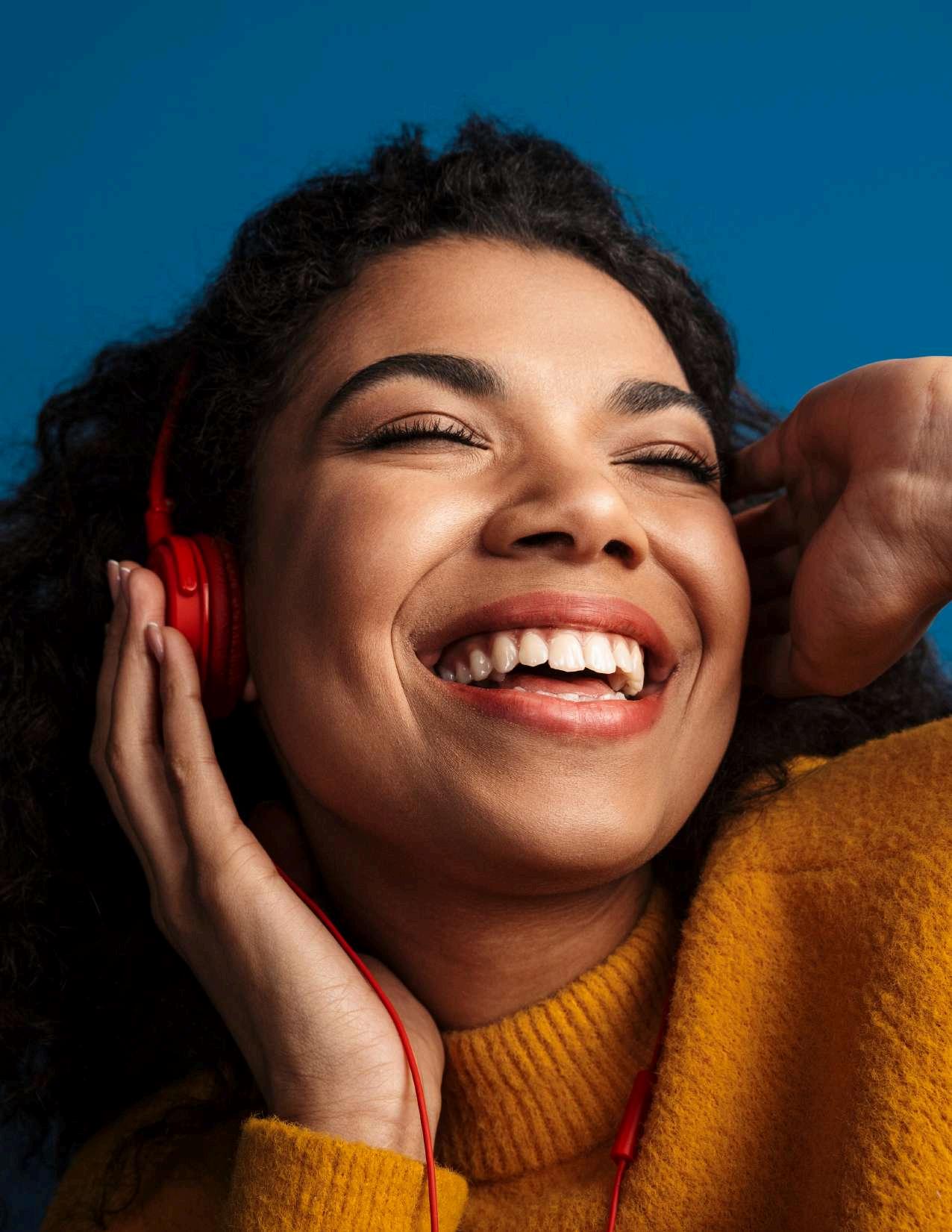
Rutendo Nyamuda
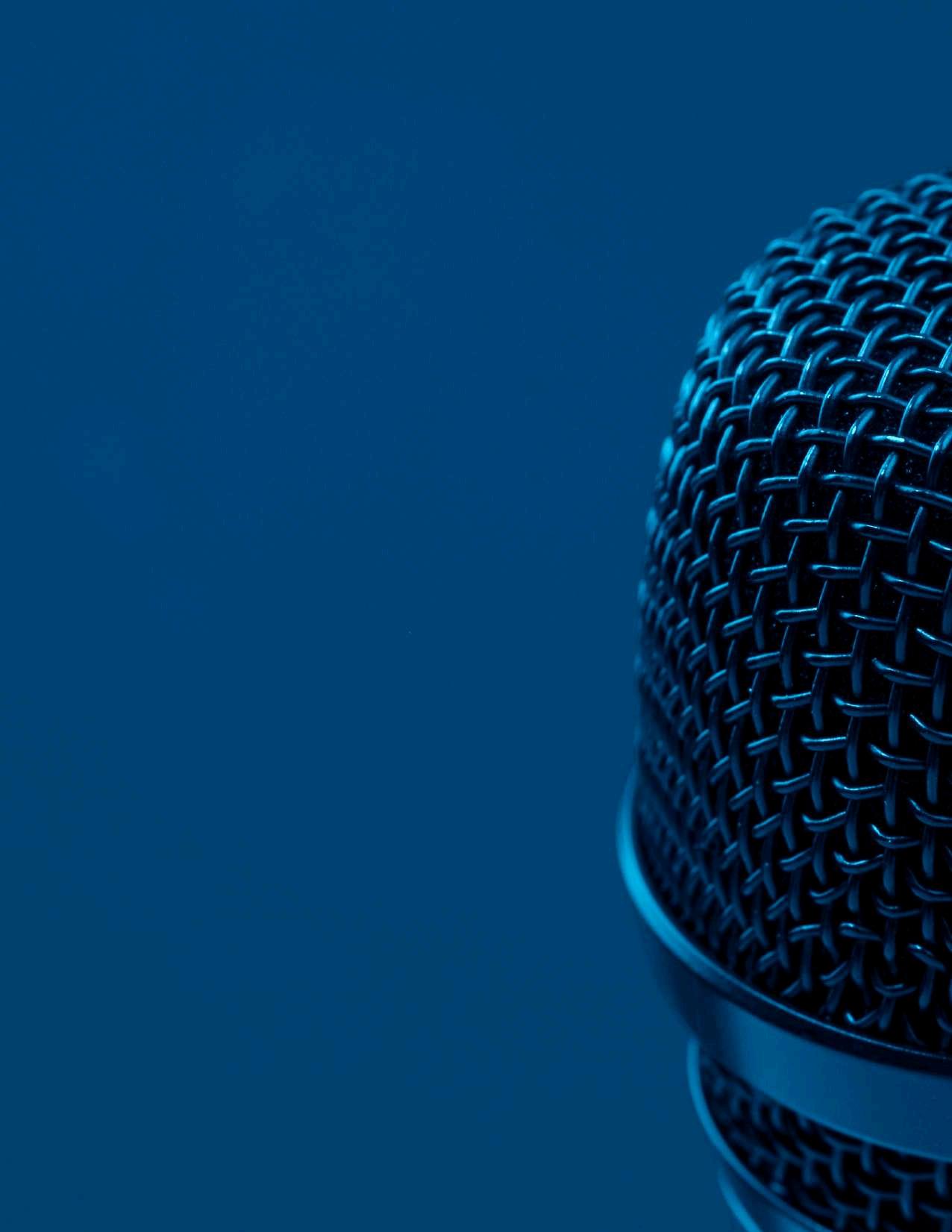
Michael Mbaya,
Maqondwana and Zweli Mbhele
Karabo Maisela
Rumbidzai Chivende Kamogelo
Odudu Efe (FayFay)
TPS staff
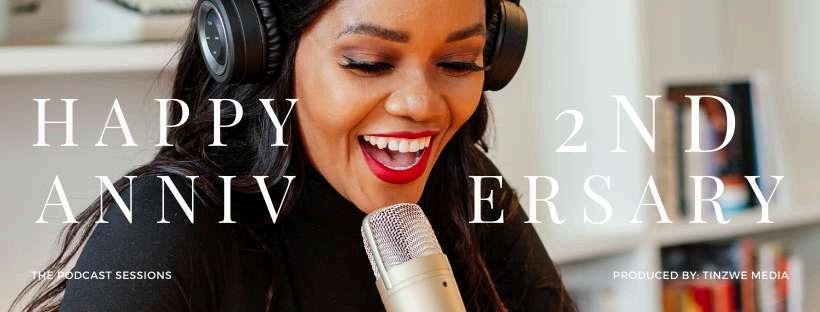
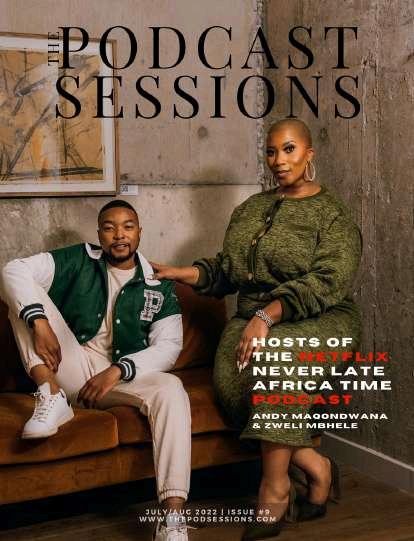
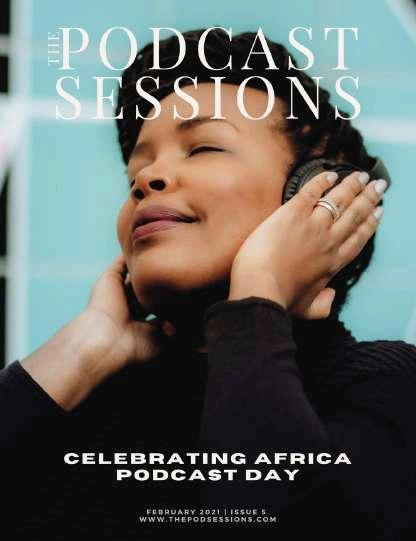
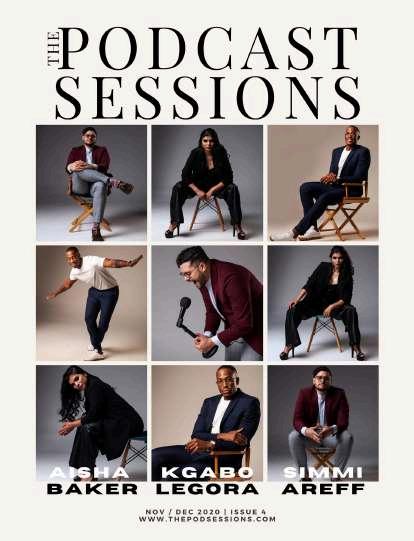
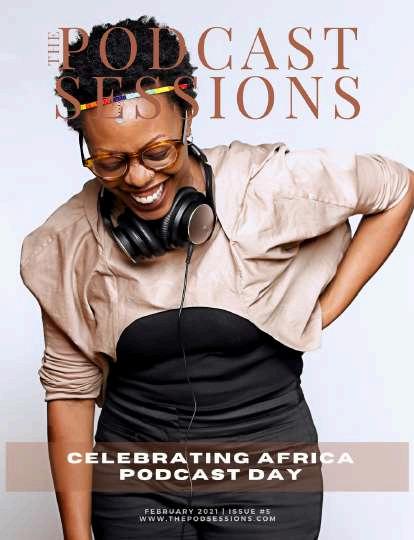
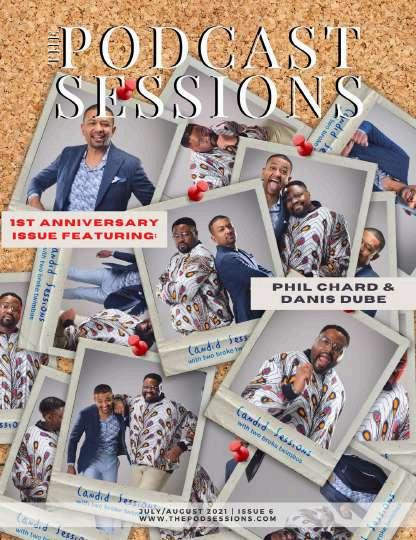
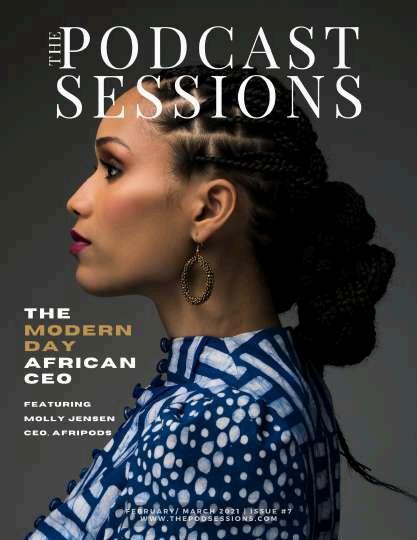



Rutendo Nyamuda

Michael Mbaya,
Maqondwana and Zweli Mbhele
Karabo Maisela
Rumbidzai Chivende Kamogelo
Odudu Efe (FayFay)
TPS staff







Life is interesting It’s full of puzzle pieces that at the time don’t make sense, but as you continue along the journey, you see how it all fits together
Two years ago, I launched 'The Podcast Sessions' podcast with a short, self-authored 11-page lead magnet titled “5 Things To Consider Before You Start A Podcast”.
That lead magnet turned into Africa’s first and only podcast magazine consisting of roughly 38 pages, with four to five contributors in each issue. We’ve so far produced nine issues with seven original covers, featuring pioneers in the African podcast scene
I say this to share two of the greatest lessons I’ve learnt so far
The first is, don't discount any career experiences because you never know how those skills will serve you in the future. My first internship was at Seventeen magazine (SA). A few years later I worked as a journalist for Forbes Africa and CNBC Africa Online. And while my career expands far beyond these experiences, those opportunities became the foundation of our magazine and news website
The second lesson is, it’s okay to start small That tiny 11-page lead magnet was the inspiration for where we are today, featuring a cover with the co-hosts of Netflix’s first African podcast, Never Late | African Time with Andy Maqondwana and Zweli Mbhele
I'm excited to see what lies ahead as we continue our mission to provide a platform for people to share podcast news, events, insights, and stories.

Thank you to everyone who has been part of 'The Podcast Sessions journey'.
Just remember, no matter where you are along the journey, start where you are with what you have Although the road may be dark, it will light up as you begin to walk your path
LET'S CONNECT: RUTENDO@THEPODSESSIONS COM
IG: @ROO10DOUGH
TWITTER: @ROO10DOUGH

Kamogelo Lekhu is a BA graduate in Sound Production at SAE Institute
South Africa He's done freelance work, editing and mixing for independent podcasters during and after his studies He works as an engineer alongside the revered Peter Auret, at Sumo Sound
Recording Studio
Instagram: @soulistikamo
Writer: The Podcast Sessions

FayFay is an audio storyteller, audio producer, podcast producer, and podcaster who runs an audio production company, 808 Xtra Sound She founded a podcast community – NaijaPodHub – to grow and build the Nigerian podcasting industry She has a background in radio, imaging and production
Instagram: @iamthefayfay
Twitter: @iAmTheFayFay Community: NaijaPodHub

Rumbidzai Chivende is a radio news anchor, journalist, and podcaster. She currently works part-time as a voiceover artist and is the host of the current affairs show at Voice of Wits FM, where she compiles and produces her own show
Twitter: @missrumbiiee

Adrian Dingiswayo is part of The Morning Muse podcast Their audience is estimated at approximately 7 000 daily listeners, with over 35 000 total listens The team hopes to inspire people to see that success is possible through their interviews with successful professionals
Instagram: @themorningmuseofficial Podcast: The Morning Muse Website: The Morning Muse

Karabo Maisela is an honours graduate in Performance and Visual Arts from the University of Witwatersrand She wrote and directed her first stage play in 2016, which was performed at the Fringe Theatre and won best script at the FEDA Festival She is also a poet
Instagram: @theeanswer
Writer: The Podcast Sessions


Michael Mbaya is a photographer, videographer and filmmaker He is also the man behind the cover shoot of the November/December 2020 issue
Michael and Jeanine are the brains behind December Fifth, a dynamic and diversely skilled team of creatives They focus on digital content creation for brands and SMEs
Instagram: @michael mbaya
Instagram: @decemberfifth studios
Twitter: @Tapiwa Mike
Andy Maqondwana and Zweli Mbhele are the co-hosts of Netflix’s first African podcast, Never Late | African Time
They are both prominent radio personalities in South Africa Zweli hosts a show on 94 7 and Andy has a show on Kaya FM
Andy Maqondwana
Instagram: @andymaqondwana
Twitter: @andymaqondwana
Zweli Mbhele
Instagram: @thezweli
Twitter: @TheZweli

LOCATION: WORKSHOP 17
This year has proved to be one of the biggest for the African podcast scene. Across borders new podcasts, production companies, partnerships, and awards are launching quicker than the speed of sound. Internationally, the continent has caught the ear of some really big players. One of those just happens to be a $176.07 billion company called Netflix.
On 26 April 2022, the news of Netflix’s first African podcast, Never Late | African Time, made headlines, together with the announcement of the incredibly talented co-hosts Andy Maqondwana and Zweli Mbhele
The pair sat down with The Podcast Sessions at Workshop 17 The Bank in Johannesburg for an exclusive interview on the rollercoaster ride
“I'm not as anxious as I was on the day of the first shoot – we were a mess,” laughs Andy as she takes a seat, beautifully dressed in a lavender pantsuit
Across from her in a crisp white shirt, Port Varsity cardigan and khaki pants, her co-host Zweli lights up as he recalls the rigorous audition process which led to their final online chemistry audition Facing back at them were blank, camera-less screens behind which producers and decision makers sat, holding the power of their dreams in their hands No matter the decision, with one look, Zweli and Andy decided to leave everything on the floor
“My mentality was, this is Netflix, and you're going to give it your all or just don't do it at all So my whole thing about it was, just close your eyes, think big and see yourself on the other side,” says Zweli as he smirks
After two weeks of refreshing emails and waiting for the phone to ring, Andy and Zweli received the news that would change the course of their careers A couple of meetings and a few signed NDAs later, the co-hosts of the historic Netflix Africa podcast hit the ground running on a production that would see them interview some of the biggest actors and influencers from countries including South Africa, Kenya and Nigeria

The build-up to the first day of filming could’ve been a reality show in itself It involved a long process of research, going over scripts, and many rounds of editing
“We started off in the research phase We got a research pack and everybody had to go out, go through this research pack, and read through every single guest profile, the interviews they've done and their productions. And then we get into the script phase, where we then go through the scripts and learn things like the pronunciation of words,” says Andy.
Zweli jumps in, adding that something he really appreciated about the process was that the producers wanted to make sure the hosts were themselves and that their unique voices were heard.

“We were really allowed to be ourselves throughout the process, which is something that is so cool Because I mean, being in this industry for some time, there's a lot of times that you really can't be yourself. You’re told this is what you're going to do, this is how you're going to be, this is how you're going to dress, you are now our product. And that didn't exist [at Netflix], there was a lot of creative freedom within the process as well,” he says.
Up until then there were about five people that the pair were interacting with, but their first day on set was a very different game.
“You get to set and there are about 45 people and you're like, wait a minute. Wait a minute. Like it's quite a massive production, from camera people, make-up artists and runners. It’s such a great and well oiled machine,” says Andy.

"You get to set and there are about 45 people and you're like, wait a minute. Wait a minute. Like it's quite a massive production, from camera people, make-up artists and runners. It’s such a great and well-oiled machine."
- Andy Maqondwana

When asked about their favourite episodes, both Andy and Zweli struggle to name just one – naming each episode until they listed all of them, laughing in-between However, there were a few memorable moments that stood out for each of them. For Andy, it was the Legends episode featuring Nandi Nyembe, Connie Chiume, and Israel Matseke Zulu.
“That one was special because we get to hear iconic people's stories For them I think they came in saying we're not going to give you PR answers, we're gonna tell our story. And I enjoyed that because to tell your story, as grim as it is, and to show your journey, that has not been easy I think that was just such a powerful moment and the fact that they let us in in that way,” she says
Zweli, on the other hand, recalls the Comedy episode featuring Kunle Remi and Celeste Ntuli.
“We were laughing even before we were on set and throughout that episode Like there were times when you'd actually have to cut,” he laughs, recalling some of the things he couldn’t divulge in the interview.
When asked what this moment means for her career, Andy pauses, as if to keep a tear back After a moment she answers, providing a rare, honest glimpse into the reality of the media and entertainment space that can often make you feel like you’re not enough.
“It was an affirming process,'' she says confidently
“Dreams that I had for myself, and I wrote down and prayed over silently, just happened in the most inconspicuous ways. Because if I knew how big this would be, I think I would have been like, ‘I can give you suggestions of people who could do this And I'll sit this one out ’ But this process showed me that I'm ready I am the girl that I think I am I'm enough as I am And more than anything, me being here in this place, as I am as a plus-size black woman, it shows so many other plus-size black women that I don't have to change for nothing, you will make clothes that fit me and I will look good on set, and you will be fine,” says Andy

"Being on a project as monumental as this, I mean, sometimes I have to think to myself, like, this is literally the first Netflix podcast on the African continent."
- Zweli Mbhele
Zweli, moved by Andy’s honesty, hypes up his cohost, displaying the awe, respect and appreciation he has for her For him, this moment was a dream realised, too
"Being on a project as monumental as this, I mean, sometimes I have to think to myself, like, this is literally the first Netflix podcast on the African continent, not just in South Africa or in the province, on the African continent You know that really spurs you on I'm going to carry on doing bigger and better It's been an unbelievable ride,” he says

No doubt this experience has been monumental, seating Andy and Zweli among some of Netflix’s other successful podcasts, including '10/10 (Would Recommend)'; 'You Can’t Make This Up'; 'Bridgerton: The Official Podcast'; and 'Why are people watching this?' to name a few
Who knows where this journey will take them next All we can say is that, as 'The Podcast Session's, we’ll be waiting in the wings for season 2 of Never Late | African Time And hopefully the team will invite us to cover behind the scenes Hint, hint Netflix

ADVERTISE WITH THE PODCAST SESSIONS TODAY


Impostor syndrome can show up in many forms, and essentially it refers to a subconscious experience of believing that you’re not as competent as others. It often occurs in high achievers who are unable to celebrate their success, large or small. Sound familiar? It did for me.
In the podcasting space there are many individuals who are unable to celebrate their achievements and successes, which makes them more likely to experience burnout. Celebrating your success, large or small, is part of the process. This was news to me, as celebrating my achievements has often felt like a luxury. But, it’s a necessary part of recharging yourself, and making sure that you’re benefiting from the work you’re putting out as much as others are
At the start of this journey I struggled with impostor syndrome and often felt out of place speaking to people who have given the world so much, but once I realised that I could also help someone through my platform and experiences, my perspective shifted.
My journey into the podcasting space started with the journey of self growth and self betterment. Through wanting to be the best version of myself, it helped me rediscover the curious part of myself, which was centred around a love for learning and growing. I’ve always enjoyed hearing different perspectives on a wide range of topics, and podcasting gave me the chance to listen to creatives and hear them express themselves in a way fans and supporters have never heard before When I began podcasting I didn’t know exactly what I wanted to do, but the goal has always been to learn and help people, and with this platform I was able to create a community and show people that their favourite influencers and superstars are also “just” people who encounter challenges. To show people that at some point these creatives were in the same position as you are now, and that you can also achieve great things, which is where our show’s signature question, “What does happiness mean to you?”, came from
Podcasting has opened so many doors for me and put me in a position that I would never have dreamt of – this has been through God's favour and being invited to some of the biggest African events in the podcasting world.
In regard to business, the biggest lesson I’ve learnt is if you venture into this space with the intention of purely making money, your audience and people who engage with your content will hear that, and the show will lose its authenticity I believe that if you focus on creating the best work you possibly can and invest time in your craft then everything else will follow.
Sponsorships are a big part of podcasting, and the best sponsor for smaller podcasts in my opinion is Anchor, as being on their file-hosting network provides a lot of benefits They have rates for every thousand podcast views and they also push your show to other platforms in order to increase engagement Anchor has helped me monetise my content by opening up various sponsorship opportunities, and it has helped connect me with other individuals who share my love for creating.
The content I create as The Morning Muse Podcast is interview-based in order for listeners to hear their influencers speak about the highs and lows and challenges they’ve faced, and how they’ve managed to persevere
"I BELIEVE THAT IF YOU FOCUS ON CREATING THE BEST WORK YOU POSSIBLY CAN AND INVEST TIME IN YOUR CRAFT THEN EVERYTHING ELSE WILL FOLLOW."

The popularity of social media has caused a lot of individuals to compare themselves to others and beat themselves up for not being in a certain position yet, and feeling that they have to achieve something by a certain age Our platform tries to show people that everyone who is successful has also struggled with these issues, and listeners get some insight on how these people managed to be in the position that they’re in now and any lessons they learnt along the way.
I believe that everyone has a calling and should be open to new experiences and opportunities to try and help find theirs I hope that this piece helps someone in some way




The podcasting industry is growing every year and there are several companies that have dedicated resources to monitoring this growth However, the following questions still remain: who are these companies, how many of them are out there, and where can one access their research? If you do a quick internet search, the top company you’ll probably find is Edison Research
However, when you look for African companies doing this kind of research, you’ll only find Africa Podfest, which is still fairly new.
Edison Research is a US-based research company that has what they refer to as The Infinite Dial, which is a ”survey of record for digital audio, social media, podcasting, smart speakers, and other media-related technologies since 1998” (Research, 2021).
This means that anyone who is looking to do serious, in-depth research on the podcast space, the digital audio platforms used for podcasting, and other factors that may affect podcasting, should look to Edison Research. It truly is your one-stop shop for all the information you may need If you’re an African podcaster from a country other than South Africa, you may need to find another resource as The Infinite Dial is limited to South Africa in terms of that kind of information.
When asked in an interview why Edison Research chose South Africa when there are other pioneering podcast countries like Kenya and Nigeria, Larry Rosin, President of Edison Research, said: “It really wasn’t us targeting South Africa so much as it was South Africa asking us if we would be open to partnering to do something like this” If this statement is true, this means other African countries have not yet realised the importance of conducting such research and I certainly hope that changes after reading this article.
In Australia, you can find the Acast Sounds Smart Report, which is “Australia’s largest body of podcast-specific research, undertaken with the aim of uncovering why people are listening to podcasts, how and when they’re listening, and the impact podcast advertising is having for brands”. This report gives information that is incredibly detailed and specific to podcasting Anyone wanting to invest in a podcast in Australia would know exactly who their market is and what kind of content would most likely be consumed by listeners, which would minimise the risk of starting by a significant amount.
On the African continent, the only information hub you may come across is Africa Podfest Africa Podfest is a black women-led podcast information company that does research, collates a database of African podcasters, and hosts several events. They have created a name for themselves with their Podcast Day, which aims to bring podcasters together physically and virtually to share and receive information regarding Africa’s current podcasting space.
Africa Podfest recently conducted a survey in order to map out both current and future podcast listeners, which will give Africa Podfest an idea of the Kenyan, South African and Nigerian listenership. Other African countries are yet to be included in this research. The findings of this research have been quite revolutionary in the sense that it has given African podcasters information about the average listening duration, the platforms that are used the most to listen to podcasts, the percentage of the population that listens to podcasts, and so much more.
"PODCASTING LITERALLY PUTS THE MIC INTO THE HANDS OF COMMUNITIES WHO HAVE NEVER HAD IT BEFORE.”

Why is research in the African podcast space important?
As previously mentioned, having access to information like who is listening to podcasts, how often people are listening to podcasts, how many people are engaging with ads in podcasts, etc. would provide podcasters as well as investors with the kind of information they would need for risk analysis. As much as podcasting doesn’t have to be an expensive field to venture into, people who are seriously considering a piece of this growing pie might want to invest in things like studios where they can produce daily podcasts. In order to do that, you would need to know if this investment would be worth it or not.
The African podcast space is a very lucrative market in the sense that colonialism and globalisation have locked African content in a hidden archive that is waiting to explode and shake up the rest of the world. At the moment the majority of the content people are exposed to is based on a Western blueprint In an interview, Melissa Mbugua from Africa Podfest put it perfectly by saying: “Podcasting literally puts the mic into the hands of communities who have never had it before”. Introducing brand-new African content through an unrestricted platform like podcasting would give Africans from every corner of the continent a unique opportunity to participate in the global digital media market.

WRITTEN BY: RUMBIDZAI CHIVENDE

Hosting a podcast or radio show alone can be terrifying, however, going solo isn’t so bad. If you have a message that you believe deserves to be shared then going solo is ideal as it allows you to express and project how you really feel about certain topics, stories and narratives.
Although many podcasts still follow the format of one or two hosts who interview various guests, it doesn’t mean that if you follow a different path then you won’t succeed.
Before we get to how you create a bang-up solo podcast episode, let’s check out why solo podcast episodes work so well.
A solo podcast episode is an episode consisting of only the host who elaborates on a topic they’re an expert on or something of interest to them Think of it as a TED Talk but without the live audience Normally, a solo episode is shorter than an interview because there is only one person talking However, just because they’re not as long doesn’t mean solo episodes cannot have equal amounts of rich, thoughtful and authentic content

SOLO EPISODES ARE GREAT BACK UPS FOR SLOW CONTENT SEASONS.
SOMETIMES A GUEST WILL CANCEL LAST-MINUTE OR THERE’S A BLANK SPOT IN THE QUEUE — TRY A SOLO EPISODE TO FILL THE GAP.
1. Fill down periods with rich, exciting content. Solo episodes are great back ups for slow content seasons. Sometimes a guest will cancel lastminute or there’s a blank spot in the queue try a solo episode to fill the gap.
2. Keep things fresh.
An interview-only show can get a little stagnant for your audience. Throw in a curveball here and there by offering a solo episode.

3 Create a stronger connection
A solo episode featuring just the host can seem more organic to the listener It’s a great way to cultivate an intimate connection between a host and their audience
4 Fill in the gaps
Use a solo episode to supplement tactical insights for your audience. This way, you can clear up any confusion around a topic quickly and without the diversion of a guest.
1. Come up with a list of solo episode topics. If thinking up solo podcast ideas don’t come naturally to you, don’t fear. There are numerous ways to brainstorm a list of episode topics. Webinars, videos, and LinkedIn posts are all great sources of content that you could use as inspiration for a solo episode.
2. Research the questions people are asking. To make sure you cover a topic comprehensively, try to pre-empt the questions that your listeners might have about it.
3. Find ways to engage with your audience. When you have a solo podcast, the connection really is between you and your listeners so where you can, try to involve them in the show.
4. Work on your delivery. With the focus on you and your voice, it’s key that you come across as very polished.
5. Become an entertainer. Where you can, inject some personality into your show. Allow your listeners to get to know you and what makes you tick.
WRITTEN BY: KAMOGELO LEKHU
One of the most common questions every podcaster asks is, “Which microphone should I use?” And while we all have our preferences and some might even be brand loyal, that debate will go on until the last podcast is uploaded
In an article on The Podcast Sessions’ website titled Which microphone to choose: Dynamic, Condenser or Ribbon, I unpacked the different kinds of microphones But here I want to get a little more technical and discuss the differences between XLR and USB microphones


XLR Microphones
XLR microphones use three-point balanced connector cables, known as XLR cables, to receive phantom power (if necessary) from your sound card/preamplifier, as well as transfer electro-acoustic signals to your sound card’s A/D converter (analog to digital converter) As a result, XLR microphones require a lot from an operational point of view, in requisite cabling and an independent sound card with XLR microphone inputs This can be problematic, as each device or component in the recording path has its own degree of white noise that can be introduced to your audio signal
USB microphones
USB microphones can feature the different types of circuitry discussed in the aforementioned article, but USB microphones usually combine all the required components from its XLR counterparts in a single package. USB microphones don’t require phantom power as they are powered directly from your computer’s power supply, and therefore don’t require a sound card in that regard, as well as for preamplification or A to D conversion. USB microphones typically have their own built-in converters, to transmit audio data from the microphone to your computer. This allows your computer to recognise your USB microphone as both an input and output device, thanks to some USB microphones having a D to A converter (digital to analog converter) The D to A allows the microphone to have headphone inputs
The built-in capabilities of USB microphones certainly give them a leg up on XLR microphones in terms of compact design. USB microphones are however not immune to a degree of white noise. I’ve experienced USB microphones in a podcast setting that bleed playback audio from a guest’s microphone into the host’s signal due to poor conversion, managing both outgoing and incoming signals from the microphone. If this happens to you, it would be best to use your computer’s main audio output for playback to avoid this problem.


"We’re currently doing all we can to ensure that the industry becomes one that is so significant and impactful that it becomes a stronger contender in the media space."

I created NaijaPodHub because I realised that the struggles I was facing as a podcaster would someday be the struggles of another podcaster I also saw that finding like-minded people with similar interests can sometimes make things easier to handle, because at least you have someone to share your struggles with
No one is an island, and there are days when it gets hard. Having a community helps build support, and knowing you’re not alone when struggling, having someone that can help you through struggles, and finding solutions in one place is what makes a community important.
When I discovered podcasting back in 2016, it appealed to me. I was working in radio at the time so I had some studio equipment to experiment with, so I started and haven't looked back.
How to plan a season of my podcast for sustainability I think most people start a podcast thinking they have to produce their content weekly until they realise how tedious it is. Sometimes, a lack of ideas or inspiration can even stop you from being able to put out content I wish I also knew that using content producers or a production team is applicable to podcasting



F I V E
SETUP?
I have a Takstar XLR microphone, a PreSonus and Behringer sound card I use Adobe Audition, Logic Pro and Pro Tools for editing and production, and I have KRK Rokit 5 studio monitors and Beyerdynamic DT 990 headphones
FOUR Changing the podcasting game in my country. AFRICAN PODCAST SCENE? PODCAST ACHIEVEMENT?
S I X BEST THING?
The ability to put your own spin on whatever story you’re trying to tell the endless possibilities of things to create
Monetisation is currently challenging because it’s tough to promote good content when you don’t have the advantage of numbers If you aren't "popular" on social media it’s a long road to getting the kind of numbers that will interest brands and advertisers. It can take a long time, but it will happen eventually if your content is good and you do your best to be consistent.

T E N
The podcast scene in Africa is one that is constantly growing and African podcasters are very invested in seeing this industry thrive We’re currently doing all we can to ensure that the industry becomes one that is so significant and impactful that it becomes a stronger contender in the media space






































